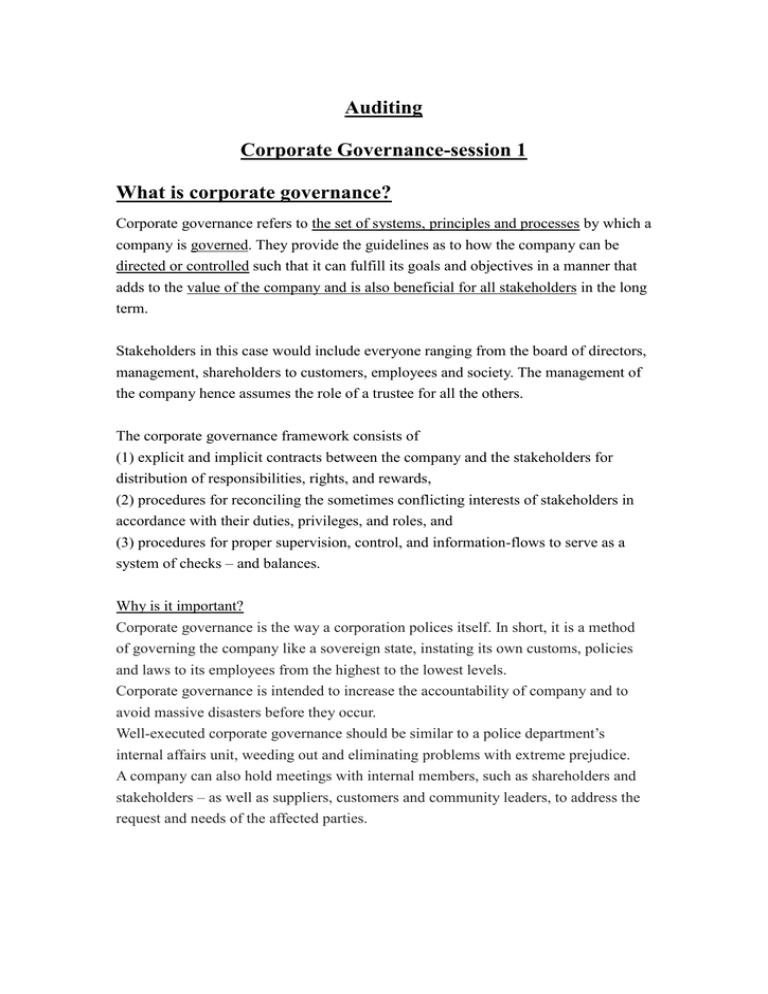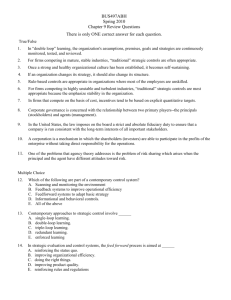corporate governance gp3 (2)
advertisement

Auditing Corporate Governance-session 1 What is corporate governance? Corporate governance refers to the set of systems, principles and processes by which a company is governed. They provide the guidelines as to how the company can be directed or controlled such that it can fulfill its goals and objectives in a manner that adds to the value of the company and is also beneficial for all stakeholders in the long term. Stakeholders in this case would include everyone ranging from the board of directors, management, shareholders to customers, employees and society. The management of the company hence assumes the role of a trustee for all the others. The corporate governance framework consists of (1) explicit and implicit contracts between the company and the stakeholders for distribution of responsibilities, rights, and rewards, (2) procedures for reconciling the sometimes conflicting interests of stakeholders in accordance with their duties, privileges, and roles, and (3) procedures for proper supervision, control, and information-flows to serve as a system of checks – and balances. Why is it important? Corporate governance is the way a corporation polices itself. In short, it is a method of governing the company like a sovereign state, instating its own customs, policies and laws to its employees from the highest to the lowest levels. Corporate governance is intended to increase the accountability of company and to avoid massive disasters before they occur. Well-executed corporate governance should be similar to a police department’s internal affairs unit, weeding out and eliminating problems with extreme prejudice. A company can also hold meetings with internal members, such as shareholders and stakeholders – as well as suppliers, customers and community leaders, to address the request and needs of the affected parties. 10 concepts of corporate governance 1. Honesty not only to telling the truth but also no giving half-truths or misleading shareholders and other stakeholders. Probity also involves not accepting lavish hospitality or gifts with a significant monetary value and certainly not accepting gifts that can influence their decisions. 2. Accountability means that directors are accountable to shareholder and to some extent to stakeholders. 3. Independence is an important concept in relation to directors. The concept strongly emphasizes the appointment of independent non-executive directors. NEDs are not primarily employed by the company nor are they involve in the day-to-day operations of the entity. Thus, they should be free from conflicts of interest and are therefore in a better position to promote the interests of shareholder and other stakeholders. They are able to monitor effectively the activities of the entity and the executive directors. 4. Responsibility means management accepting the credit or blame for governance decisions and will take whatever corrective action is necessary in order to keep the entity focused. Responsible management should do, when necessary, whatever it takes to set the company on the right path. 5. Judgement means that decision making from broad could enhance the prosperity of the organization. This means board members must acquire a broad enough knowledge of the business and its environment to be able to provide meaningful direction to it. This has implications for the way directors are recruited and trained. 6. Reputation especially a good one is a valuable asset because it impacts on the price of publicly traded shares of the entity. Therefore, directors strive to build the reputation of the organization. 7. Integrity means straightforward dealing and completeness. What is required of financial reporting is that it should be honest and that it should present a balanced picture of the state of the company’s affairs. The integrity of reports depends on the integrity of those who prepare and present them (Cadbury report) Holders of public office should not place themselves under any financial or other obligation to outside individuals or organisations that might influence them in the performance of their official duties. 8. Fairness – the directors’ deliberations and also the systems and values that underlie the company must be balanced by taking into account everyone who has a legitimate interest in the company, and respecting their rights and views. 9. Transparency mean the open and clear disclosure of relevant information to shareholders and other stakeholders, also not concealing information when it may affect decisions. It also includes all voluntary disclosure, that is disclosure above the minimum required by law or regulation i.e. management forecasts, analysts’ presentations, press releases, information placed on websites and other reports 10. Clarity - such as framework, policy, monitoring performance, strategy directions. Benefit of corporate governance 1. 2. 3. 4. 5. 6. 7. 8. 9. Prevent conflict of interest Deal with agency problem The advantages of corporate governance Improve the profitability (reporting and performance) Effective risk management Reduce fines and penalty and loss of goods Improve the relationship with bank Address the governance risk Improve reputation 10. Understand the market (competition advantages and customer needs) The importance of corporate governance Corporate governance gives importance to shareholders’ welfare and also includes the relationships between the strategic goal of the company and its stakeholders. This relationship helps to sustain the business for longer period. 1. Management An advantage with corporate governance is that the benefits are measureable. Good corporate governance ensures that the board of control and management take the necessary steps that are in the best interest of the business of the company. 2. Transparency Corporate governance practices encourage a system of internal control, which in turn leads to better profit margins. Thus, for a company, corporate governance initiatives make it possible to attract equity investors. The corporate value of the company is increased by adopting good corporate governance practices. 3. Benefits to shareholders Good corporate governance initiatives can assist the board of control and the management to act on objectives that are in the best interest of both the company and the shareholders. The shareholders also have greater security on the investments they have made because of the transparency and access to investment details. 4. Benefits to the National Economy If a country has a reputation for its strong governance practices, this leads to greater confidence in the investors, which in turn leads to a good flow in capital. The reporting and accounting standards adopted by the country are also an important factor to bring in investments. Corporate governance reports Corporate governance reports include the following main five components that are 1.Role of board, 2.Quality of financial reporting and auditing, 3.Directors' remuneration, 4.Risk management and 5.Corporate Social Responsibility – CSR 1.Role of board Principle The Board believes that good governance emanates from an effective board which, directly and indirectly through its committees, leads and provides direction for management by laying down strategies and overseeing their implementation by management, reviews the operational and financial performance, and provides oversight to ensure that a sound system of internal control and risk management is in place. The Board has the overall responsibility for evaluating and determining the nature and extent of the risks it is willing to take in achieving the Group’s strategic objectives, and maintaining sound and effective risk management and internal control systems for the Group to safeguard Shareholders’ investment and the Group’s assets. 2.Quality of financial reporting and auditing 2.1 Financial reporting The annual financial statements should give a true and fair view of the Group’s state of affairs, results and cash flows for the year. In preparing the financial statements, the Board: (i) adopted HKFRSs, which conform to the International Financial Reporting Standards in all material respects; (ii) selected suitable accounting policies and applied them consistently; (iii) made prudent and reasonable judgements and estimates; and (iv) ensured that the financial statements were prepared on a going concern basis and show a true and fair view of the state of affairs of the company and of the Group as at the year-end date and of the Group’s profit and cash flows for the year. The Board is committed to presenting a balanced, clear and comprehensible assessment of the Group’s operational performance, financial results and prospects to Shareholders and other stakeholders in a timely manner. 2.2 Auditing Principle Audit quality is not defined in auditing standards. Standards guide auditors on what to do in an audit and compliance with standards will indicate that an audit has been carried out to acceptable levels of quality. In the standards in use now, two specifically address quality – HKSQC 1, which addresses quality control procedures across the whole audit firm and HKSA 220, which focuses on quality control in the context of individual audit engagements. Many factors contribute to or influence the quality of audit, and chief among them are the skills and experience of the people doing the audit. Another is the rigor of the audit methodology. The balance may vary from audit to audit Elements of audit quality 1. Culture within an audit firm Culture includes leadership and an environment that promotes and recognizes quality. 2. Skills and personal qualities of audit partners and staff This goes beyond technical skills to include adherence to ethical principles, application of professional skepticism and appropriate supervision and support for audit staff. 3. Effectiveness of the audit process Application of a well structured and thorough audit methodology supported by effective and relevant teamwork and not constrained by financial pressures. 4. Reliability and usefulness of audit reporting Reporting that clearly conveys the auditor’s opinion and effective communication with audit committees. 5. Factors outside the control of auditors These include client approach to corporate governance and financial reporting and the audit regulatory environment. 3.Directors' remuneration Principle An issuer should disclose its directors’ remuneration policy and other remuneration related matters. Remuneration levels should be sufficient to attract and retain directors to run the company successfully without paying more than necessary. The Remuneration Committee (RC) The Remuneration Committee (RC) is delegated by the Board with the responsibility to establish, review, and make recommendations to the Board on the Group’s remuneration policy and practices. The RC ensures that all employees and Executive and Non-executive Directors are appropriately remunerated in accordance with the Group’s strategy as well as its long-term and short-term performance. Non-executive Directors’ Remuneration To remunerate Non-executive Directors at an appropriate level for their commitment of time and effort to the company and to ensure the attraction and retention of high calibre and experienced individuals to oversee the company's business and development • To conduct annual reviews with reference to companies with comparable business or scale and recommend remuneration adjustments, if appropriate • To seek the Board’s endorsement for and Shareholders’ approval of any recommended changes 4.Risk management Principle The Board and the management pay particular attention to enhancing the Group’s risk management, both the structure and the process. Establishing a Risk Committee to be responsible for the Group’s enterprise-wide risk management including overseeing the relevant risk management systems and ensuring that they are compatible with the Group’s strategy and risk appetite. “3 lines of defense” model 1st line of defense – Risk management Management conducts an Internal Control Self-evaluation annually Different policies, procedures and guidelines have been adopted with defined authority for effective segregation of duties and controls, and they are kept under regular review. Whistle blowing policies are in place to facilitate internal reporting Provide employees with guidelines on reporting and disseminating inside information, maintaining confidentiality and complying with dealing restrictions 2nd line of defense – Risk oversight The risk governance structure has been enhanced by: (i) the appointment of the Group Risk Officer, a newly created position to oversee all of the Group’s risk functions and head the new Risk Management Division; and (ii) the establishment of Regulatory Compliance Department to lead or facilitate the self-assessments and on-site reviews on the adequacy of procedures for compliance with the Group’s regulatory obligations. There was further investment in information security in line with industry best practice. 3rd line of defense – Independent assurance Conducting independent reviews of the adequacy and effectiveness of the Group’s internal control and risk management systems and reporting the review results regularly to the Board through the Audit Committee. Enterprise Risk Management Framework 6. Corporate Social Responsibility – CSR Principle Corporate social responsibility, or CSR, is a corporation's obligation to its stakeholders, which are any groups/people that have a stake or interest in a company's success and products. This includes customers, employees, suppliers, investors and the communities surrounding the business. It means maximizing the good and minimizing the bad effects your company has on these stakeholders' diverse interests. Categories Aspects which are material to both the company as well as the stakeholder groups outside the company Economic Economic performance Labour Practices and Decent Work Employment Workforce-management relationship Diversity and equal opportunities Equal remuneration for women and men Society Anti-corruption Public policy Anti-competitive behaviour Compliance with laws and regulations Product Responsibility Product and service labelling Marketing communication Customer privacy Compliance with laws and regulations concerning the provision and use of products and services Corporate Governance Practices Code Hong Kong: Code on Corporate Governance Practices UK: The UK Corporate Governance Code






